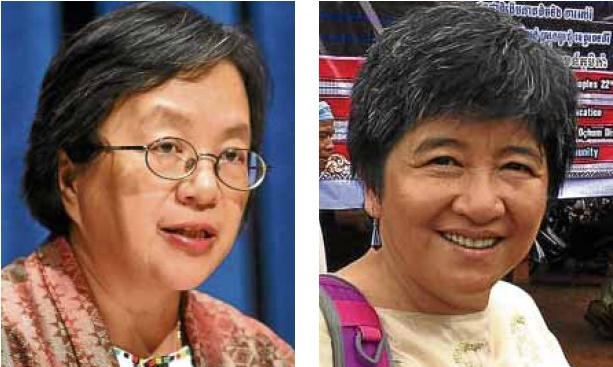UN workers on DOJ ‘terror’ list thank Baguio defenders

Victoria Tauli-Corpuz —UNSR (left); Joan Carling
BAGUIO CITY — Two Baguio residents working for the United Nations and who were listed as “terrorists” by the Department of Justice (DOJ) appeared before the City Council on Monday to thank it for standing up for them.
“What you did, when you stood up for us, you [also] stood up for human rights,” Joan Carling, a convenor of the UN Indigenous People’s Major Group for the Sustainable Development Goals, said in her address to the council, with Victoria Tauli-Corpuz, UN special rapporteur for indigenous peoples concerns, by her side.
Carling, who was also declared 2018’s Champion of the Earth by the United Nations Environment Program, was referring to Resolution No. 92, passed unanimously by the council in March last year.
DOJ petition
The resolution urged the government to remove seven Baguio activists from a DOJ petition asking the Manila Regional Trial Court (RTC) to declare the Communist Party of the Philippines (CPP) and its armed wing, the New Peoples Army (NPA), as “terror organizations.”
Article continues after this advertisementThe petition included a list of 600 individuals and groups the government had tied to the armed communist rebellion, among them Corpuz, Carling, former councilor and human rights lawyer Jose Molintas, Beverly Longid, Joanna Cariño, Windel Bolinget and Jeanette Ribaya-Cawiding.
Article continues after this advertisementCorpuz, Carling, Longid and Molintas are former leaders of the militant Cordillera People’s Alliance (CPA), which Cariño helped establish as an indigenous peoples’ rights group that opposed the Marcos regime.
The CPA is currently headed by Bolinget.
Cawiding used to head the Tongtongan Ti Umili, an urban poor group affiliated with the CPA.
The City Council said the seven Baguio residents “never joined the revolutionary groups but are passionate and active in their advocacy of human rights and the indigenous peoples’ rights, both local and international.”
Violation of due process
The resolution also said that the inclusion of the seven residents’ names on a “terrorist list” was a violation of due process, and put their lives at risk.
“We appreciate your care for people who live here. We look forward to you doing a similar thing for other Baguio citizens in the future, if something similar happens [to them],” said Corpuz, the highest-ranking UN executive to be targeted in the government crackdown against communist rebels and their alleged front organizations.
In August last year, the Manila RTC ordered the names of Corpuz and Molintas, a former member of the UN Expert Mechanism on the Rights of Indigenous Peoples, to be stricken off the DOJ list.
Corpuz said the council’s resolution helped convince the court, and showed how her community was ready to protect her.
“We felt the belongingness when the community embraced us,” she said.
Carling, Longid, Cariño, Bolinget and Cawiding have also brought motions asking the court to order their removal from the list.
Corpuz said the court was “waiting for similar motions for delisting before it would act on the pending motions [filed by the five Baguio residents].”
Council firm on challenge
Councilor Arthur Allad-iw, one of the resolution’s authors and a CPA member, said the council would stand by its decision to challenge the DOJ petition.
He said the seven Baguio residents pursued their advocacies “within the bounds of the Constitution.”
The government, he said, is obligated “to protect the human rights of its citizens and any move to trample these rights must be opposed.” —KIMBERLIE QUITASOL